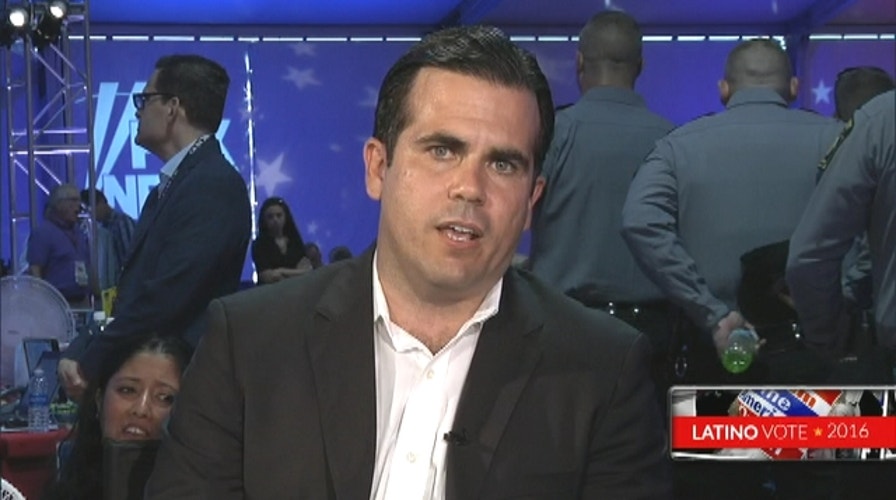Puerto Rico's Ricardo Rossello argues against bailout
Ricardo Rosello is a frontrunner candidate to become Puerto Rico's next governor.
The next governor of Puerto Rico will take office amid a $70 billion public debt that outgoing Gov. Alejandro García-Padilla qualified as unpayable.
He also will grapple with a $45 billion deficit in its pension system, as well as ailing healthcare and education systems, among other things.
According to polls, on Nov. 8 the immense task likely will fall on Ricardo Rosselló, of the New Progressive Party (NPP), who is leading his challenger David Bernier, of the ruling Popular Democratic Party (PDP), by more than 10 points.
“We studied the numbers. Though we have a delicate situation in Puerto Rico, the truth is that 16 percent of our consolidated budget goes to the debt service,” said Roselló in an interview with Fox News Latino.
He said a priority in his administration will be to cut government bureaucracy and remove the many obstacles that dissuade many from doing business with Puerto Rico.
Rossello proposes cutting the more than 120 government agencies to less than 50, and end, in his words, “the territorial, colonial status in Puerto Rico so that we can get parity.”
“It’s terrible, it’s a symptom of what’s going on in Puerto Rico,” he said. “We need to bring more economic development, we need to create more jobs.”
Bernier, a former secretary of state, cites helping the private business sector grow as a priority.
Bernier also would like a debt restructuring and other economic solutions that protect pensioners and local bondholders so they “don’t get hurt in the process,” according to published reports.
And he stresses that he would ensure that “public servers have the tranquility that they will keep their job.”
That last point, experts believe, would prove tricky for Rossello under his plan to make significant cuts to the size of government.
“It’s hard to imagine how simply consolidating [government] agencies can result in significant budgetary savings without layoffs,” said Daniel Hanson, a securities analyst with expertise in Puerto Rico.
On the long-burning issue of statehood, which a majority of Puerto Ricans favor, both candidates have said they are for it — yet critics contend that Bernier has been ambiguous about where he stands.
Roselló nudged Bernier in an open letter to be definitive and open about what he favors regarding Puerto Rico's status.
“Ambiguity is what has us under colonial inequality," Roselló wrote. "Ambiguity and being afraid to be defined is the problem. Indecision cannot be part of the solution.”
But the island's financial pressures will likely take precedence over any status debate, at least in the early stages of the next administration.
A bipartisan board known as PROMESA had given Garcia Padilla until Oct. 14 to come up with a proposal for addressing the gargantuan debt, but ultimately it will be the new governor who charts the course for resolving the economic crisis, Reuters noted.
Both Rossello and Bernier – along with a high number of Puerto Ricans – have expressed their misgivings about the bipartisan board, but have said they will work with it.
Hanson said to Reuters that he believes that board would find Rossello easier to work with because it “is going to find more in the Rossello policy that makes sense to them.”
Both men have impressive personal histories.
Rossello enjoys name recognition on the island -- his father, Pedro Rosselló, served from 1993 to 2001. But he became a standout in his own right. He got a bachelor’s degree from the Massachusetts Institute of Technology in biomedical engineering, and a doctorate from the same field from the University of Michigan. Rossello has won awards for stem cell research.
He has been involved in U.S. presidential elections, serving as delegate for Hillary Clinton in 2008, for Barack Obama in 2012, and again for Clinton in 2016.
As for Bernier, beside secretary of state, his various leadership posts have included being executive director of the Office of Youth Affairs, secretary of the Puerto Rico Department of Sports and Recreation, and president of the Olympic Committee.
When announcing his campaign in 2015, Bernier said: "The political sector in Puerto Rico has caused an extremely polarized environment, and that hurts us a lot as a country."
"It will not be a strategic plan from a political party; it will be a strategic plan for Puerto Rico," said Bernier, according to published reports.
Alfonso Aguilar, a GOP strategist and senior adviser to the Rossello campaign, said Bernier would not be the strong leader Puerto Rico desperately needs to come out of one of its worst periods ever.
“Bernier is tied to the failed administration of the current governor,” Aguilar said. “He was his no. 2 as secretary of state. He never criticized the policies that led to the current financial fiasco. But worst of all there’s a general recognition that he lacks substance and the gravitas to be governor.”
Bernier supporter Guillermo Beytagh-Maldonado, a Puerto Rico-based consultant for government and nonprofits, said that the former secretary of state has the political and administrative experience that Rossello lacks.
“He has major administrative and nonprofit experience,” Beytagh-Maldonado said of Bernier.
“Everyone is tying Bernier to the governor because he was in that same party and administration, and these have been the worst three years for Puerto Rico,” Beytagh-Maldonado said, adding that Bernier was not responsible for the troubles facing the island.
“That’s why he is not doing better in the polls,” he said.





